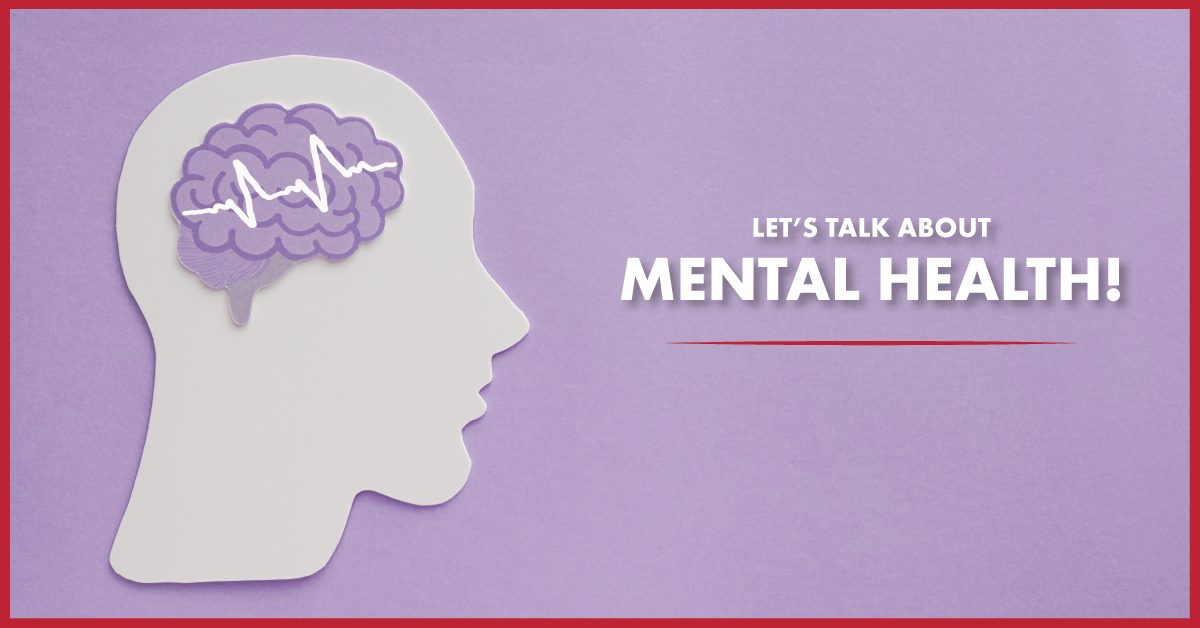Let’s talk about Mental Health!

According to the World Health Organization (WHO): “Mental health is a state of well-being in which an individual realizes his or her own abilities, can cope with the normal stresses of life, can work productively, and is able to make a contribution to his or her community.”
Mental health is important at every stage of life, from childhood and adolescence through adulthood. Furthermore, if you experience mental health problems, your thinking, mood, and behavior could be affected.
In addition to this, social and financial circumstances, biological factors, and lifestyle choices are responsible for mental health. This means it impacts how we feel, think, and behave each day. Further, our mental health also contributes to our decision-making process, coping with stress, and relating to others.
Types of Mental Illness
Some of the main groups of mental disorders are:
- Mood disorders (such as depression or bipolar disorder)
- Anxiety disorders
- Personality disorders
- Psychotic disorders (such as schizophrenia)
- Eating disorders
- Trauma-related disorders (such as post-traumatic stress disorder)
- Substance abuse disorders
- Depression is the number one cause of disability worldwide. Not only it is a significant contributor to the global burden of disease but also greatly impacts individuals, and families mentally, physically, socially, and financially.
Mental Health Signs and Symptoms
Mental health is a vital concern for healthcare professionals. Most people know the signs and symptoms of physical illnesses, like a heart attack or stroke. However, they may not be able to pinpoint the physical effects of anxiety, PTSD, or panic.
Even though each illness has its own set of signs and symptoms no two experiences with a mental illness can/will be the same.
There are some common signs and symptoms people should look out for:
- Withdrawing from friends, family, and colleagues
- Avoiding activities that they would normally enjoy
- Sleeping too much or too little
- Eating too much or too little
- Feeling hopeless
- Having consistently low energy
- Using mood-altering substances, including alcohol and nicotine, more frequently
- Displaying negative emotions
- Being confused
- Being unable to complete daily tasks, such as getting to work or cooking a meal
- Having persistent thoughts or memories that reappear regularly
- Thinking of causing physical harm to themselves or others
- Hearing voices
- Detachment from reality (delusions), paranoia, or hallucinations
- Suicidal thinking
Causes of Mental Health
Mental illnesses, in general, are thought to be caused by a variety of genetic and environmental factors:
- Inherited traits: Mental illness is more common in people when blood relatives also have a mental illness. Certain genes may increase your risk of developing a mental illness as well
- Environmental exposures before birth: Exposure to environmental stressors, inflammatory conditions, toxins, alcohol, or drugs while in the womb can sometimes be linked to mental illness.
- Brain chemistry: Neurotransmitters are naturally occurring brain chemicals that carry signals to other parts of your brain and body. When the neural network is impaired, the function of nerve receptors, and nerve systems change. Further, this leads to depression and other emotional disorders.
- Stress and periods of emotional distress can lead to an episode of symptoms: That may make it difficult for you to maintain normal behavior and activities. This period is sometimes called a nervous or mental breakdown.
Mental Health Diagnosis and Treatment
There is no physical test or scan that reliably indicates whether a person has developed a mental illness. Moreover, mental health can be complex and symptoms vary from person to person. As a result, it takes a few appointments for you to get a full diagnosis.
Treatment for mental health disorders is not one size fits all, and it does not offer a cure. Instead, treatment aims to reduce symptoms, address underlying causes, and make the condition manageable. You and your doctor will work together to find a plan. In addition to this, it may be a combination of treatments. This is because some people have better results with a multi-angle approach.
Many people who have a mental illness do not want to talk about it. However, mental illness is nothing to be ashamed of! It is a medical condition, just like heart disease or diabetes, and is treatable. We are continually expanding our understanding of how the human brain works. Treatments are available to help people successfully manage mental health conditions.
People with anxiety or depressive disorder may benefit from relaxation techniques. These include deep breathing, meditation, and mindfulness. Further, having a support network, whether via self-help groups or close friends and family, can also be essential to recovery from mental illness.
Seek professional help at Regency Hospital if in crisis. We have an expert team dealing with various problems a patient might be facing

 Call-an-Ambulance
Call-an-Ambulance



